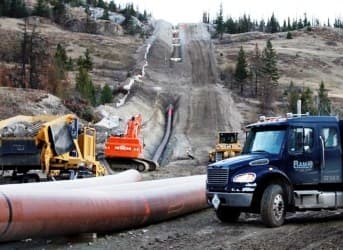A U.N. special envoy on the rights of indigenous peoples expressed concern about the ongoing hunger strike of a tribal leader protesting certain natural resource laws in Canada. The Canadian government is pressing ahead with plans to diversify an oil economy that relies almost exclusively on the United States for energy exports. Aboriginal communities along the western Canadian coast, as well as provincial leaders, have said the economic gains aren't worth the environmental risks. A recent study from Canadian researchers into oil sands development provides what may be the "smoking gun" that eventually busts the bitumen boom.
Green advocates with the group Tar Sands Blockade expressed their opposition to plans for parts of the Keystone XL oil pipeline in Texas by occupying trees in the state. The group said it was standing in solidarity with the Canadian indigenous movement Idle No More, saying pipeline planner TransCanada is eroding the sovereign rights of tribal communities. This week, U.N. special envoy on the rights of indigenous peoples James Anaya called on the Canadian government to hold "meaningful dialogue" with the tribal community given the month-long hunger strike waged by Attawapiskat First Nation Chief Theresa Spence.
"Both the government of Canada and First Nations representatives must take full advantage of this opportunity to rebuild relationships in a true spirit of good faith and partnership," said Anaya in a statement.
Related Article: Russian ESPO Pipeline Threatens Europe Oil Supplies
In Canada, opposition has swelled around plans to build the Northern Gateway pipeline for eventual exports of oil from Alberta deposits to Asian markets. Canadian Prime Minister Stephen Harper last year visited Asia in an effort to encourage oil exports from an economy that counts the United States as its dominant oil customer. Like Keystone XL, the Northern Gateway project, an Enbridge plan, has sparked environmental concerns. The country's natural resource minister, Joe Oliver, said the public would get in line behind such pipelines if assured about their safety. A recent report on the legacy of oil developments in Alberta, however, brought renewed concern about bitumen development.
Published in The Proceedings of the National Academy of Sciences of the United States, that study finds that roughly 50 years of oil extraction resulted in levels of polycyclic aromatic hydrocarbons that were as much as 23 times greater than they were when development began. The study finds that the "striking increase" in PAHs, a potential carcinogen, has resulted in distinct oil-sand lake ecosystems.
The aboriginal leader said she'd end her hunger strike Friday when she meets the Canadian prime minister. It's uncertain what, if any, his administration will do to allay tribal concerns about oil sands developments. But John Smol, one of the author's of the lake ecosystem study, said oil contamination is likely to get worse and fast.
Related Article: Oil Industry Unfazed by Shell's Arctic Follies
"Now we have the smoking gun," he said.
What he described as "back-of-the-envelope calculations" left him concerned that oil contamination was going to get worse.
"It’s not too late but the trend is not looking good," he said.
By. Daniel J. Graeber of Oilprice.com



















The hunger strike by a band chief from Ontario seems to have little to do with oilsands development and her protest bears as much resemblance to a real hunger strike as my morning jogs do to a real marathon.